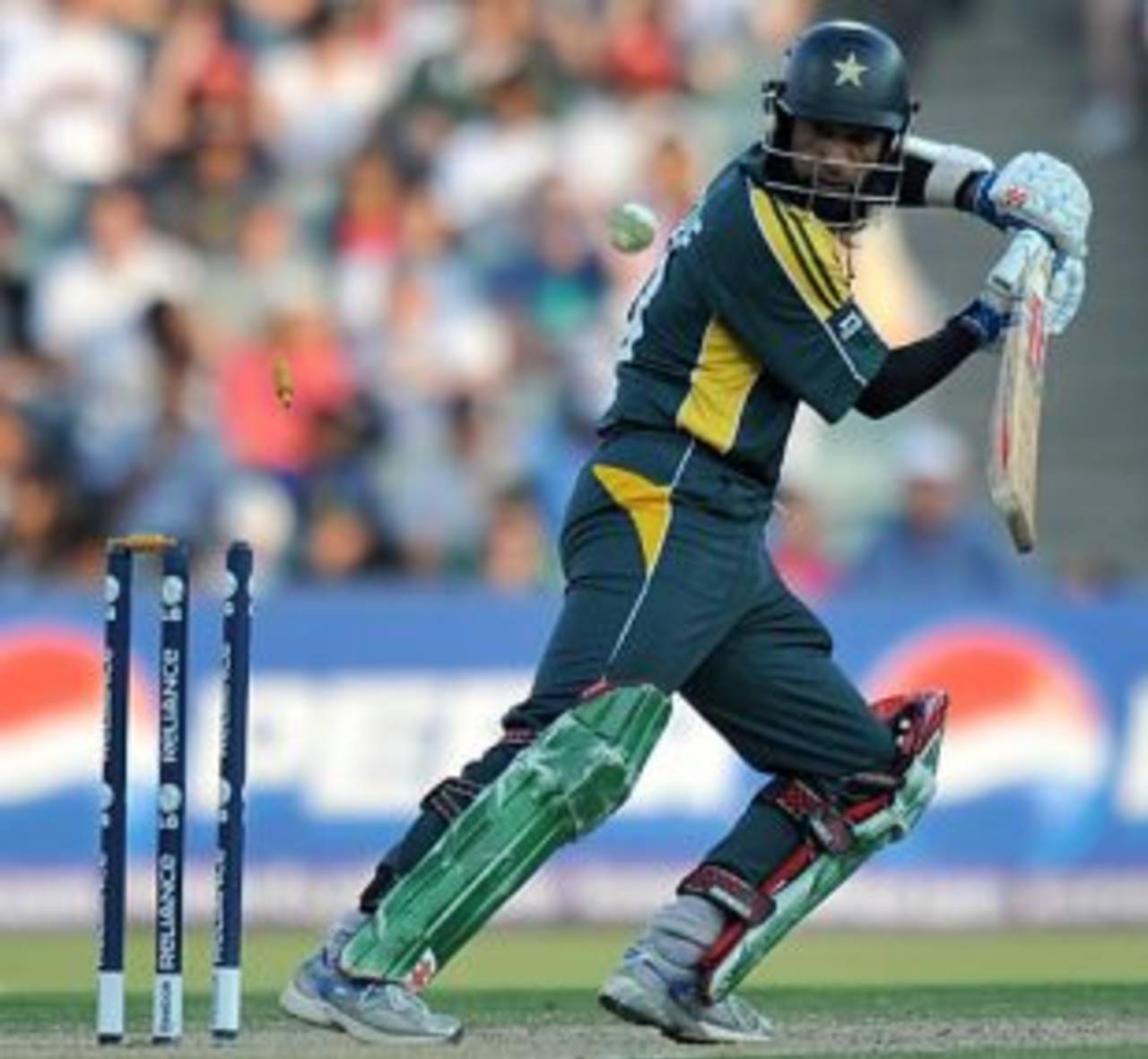Pakistan powerless in Powerplays
If we are to dissect, it is the batsmen who lost it and nothing new is said in that
Osman Samiuddin in Johannesburg
04-Oct-2009

Mohammad Yousuf has been the symbol of Pakistan's frustrating ability to lose wickets at very critical moments • AFP
Is it fair to say that Pakistan overachieved in this tournament by getting to the semi-finals? Probably so on balance, especially given that they had lost their last three ODI series. There will be disappointment at going out to a team they would've fancied their chance against on a good day, but not many in Pakistan would've turned down a semi-final run beforehand, during which they beat the West Indies, India and were a couple of wickets shy of beating the team to beat in this tournament, the team to beat anytime and anywhere.
If we are to dissect, it is the batsmen who lost it and nothing new is said in that. Pakistan's batting has been a strange beast in the Champions Trophy. It hasn't been entirely flimsy, for there has been enough depth to arrest poor starts. It has been solid enough to prevent total collapse, but not always to build from it, which is what the best teams can do. At very critical moments, they have lost wickets. Mohammad Yousuf has been the symbol of it in a way, two untroubled innings after his beautifully-constructed hand against India, ending unfulfilled in the 40s.
And throughout they have miscalculated the Powerplay; the Pakistan ODI way has always been to expect a poor start, then consolidate and build and end strong. It is the batting template that has most often seen them reach 300-plus totals and to be fair, it hasn't been without success since 1992. But Powerplays allow you to begin the onslaught early, at your choosing and ideally when batsmen are set. There is no need now to wait till the very end, as Pakistan have done, for in the death overs, common sense dictates that you will hit out in any case.
Yet Pakistan have not utilised the Powerplay when the pair in the middle is set, preferring cautiously to leave it till the end: even in the win against India, they failed to do so. In a tournament of thin lines, it has been the cause of their downfall.
As against Australia, men didn't make the most of what they began against New Zealand. Imran Nazir, Kamran Akmal and Younis Khan all fell when it seemed easier to go on and two at least to poor strokes. And just as Yousuf and Umar Akmal put things in order, the Powerplay left to the lower order. "It was a problem for us and especially in the Powerplay, where we didn't score again," said Younis afterwards. "We had a couple of good starts and they didn't cash in. At one stage we were under pressure and 160-70 looked likely. But Akmal and Yousuf had a good partnership but didn't cash in. If they had stayed till the Powerplay we could've reached 250-260."
But there have been good things about Pakistan here. They have seemed more together than in many campaigns, no scandal has rocked their boat. Key players have returned and others have continued their growth. The younger Akmal looks, with each innings, a proper find. There is a smartness and thoroughness to his work that has been missing in most young Pakistani batting talent, an ability and willingness to complement his natural range of strokes, with less flash matters, such as running well and rotating the strike.
Likewise Mohammad Aamer, who from the moment he bowled his first ball for Pakistan has looked - scarily actually given how young he is - like he has been doing it for the last ten years. He was outstanding again tonight with ball; and surely with the bat he deserves to be higher than Umar Gul?
Saeed Ajmal has brought a real edge to the middle overs. Though he aims to stem the scoring first, he is a wicket-taking threat and that is something they missed often under Shoaib Malik's captaincy. And Mohammad Asif is around again, though that must be a meticulously-handled comeback.
"It has been a good experience for us," said Younis. "We finished in the top four and it has always been my aim to finish in the top four. After that, in the semis and final you need some luck, a good catch, a good run out, an umpiring decision. But we didn't get any so we lost. But overall, after a long time, we looked like a team and we fought as a team. Overall in this tournament I think we looked good. We have two excellent young players in Mohammad Aamer and Umar Akmal, who is a very mature batsman. Even Saeed Ajmal, who has been around, has done really well. If our youngsters are performing well, then the future is bright."
It should be, even if we have all been here before. Actually this kind of situation is traditionally a fragile time for Pakistan sides, terribly prone to tipping the wrong way. But if some kind of stability can be maintained in the set-up, they are at a point again where they can look ahead with genuine hope.
Osman Samiuddin is Pakistan editor of Cricinfo